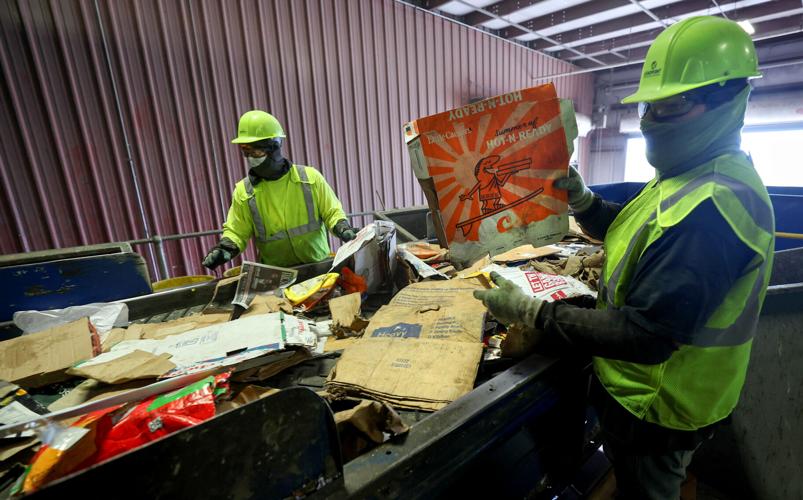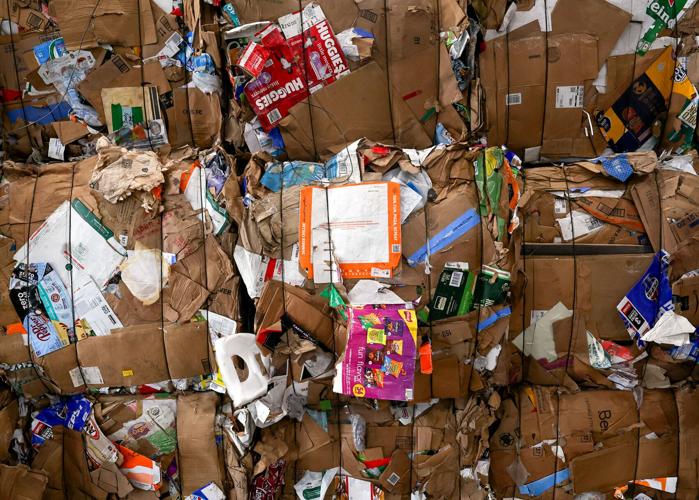Pizza boxes — even greasy ones — are now welcome in the recyclable bin, Tucson officials say.
As long as they’re mostly clean, dry, devoid of scraps and flattened, pizza boxes can now be recycled, the Tucson Environmental Services Department said last week in a Facebook post.

A Republic Services employee grabs a Little Caesars pizza box off of the conveyer belt Wednesday while he sorts through recycling items at the company’s Tucson processing center, 3780 E. Ajo Way. Tucsonans can now recycle greasy pizza boxes, officials say.
Cheese and grease “present no issue to recyclability,” the post said.
The reversal to the longstanding policy that prohibited environmentally conscious pie lovers in Tucson from tossing used pizza boxes into the recycling bin was confirmed by Republic Services, the city’s local recycling facility. The change comes after Environmental Services “recently learned from the American Forest and Paper Association that grease on pizza boxes poses little contamination to recycle locally,” according to the social media post.
There is “no significant reason” to outlaw used pizza boxes from city recycling centers and curbside bins. In fact, used pizza boxes can provide recycling centers with “valuable feedstock for new paper-based packaging,” Tucson Environmental Services says.
A Facebook user wondered if the easing on pizza box rules included recycling outside the city.
Waste Management, the private company that handles residential recycling outside the city limits, said in an email to the Star that it accepts pizza boxes in its curbside recycling bins here.
The American Forest and Paper Association’s (AF&PA), on their website regarding recycling, cited a 2019 study by American-based packaging company WestRock, which found that low-concentrations of grease wouldn’t result in the loss of paper strength in pizza boxes. Cheese, according to the study, “should not hinder” the recycling process.
WestRock estimated that 3 billion pizza boxes are “placed on the market in the U.S. annually,” representing 1.7% of the 35.9 million tons of corrugated cardboard produced annually in the country.
Tucson uses a single-stream recycling system, so residents can put their recyclables all in one bin and it is sorted at a recycling facility.
The sorting process in Tucson begins immediately after trucks dump their collected materials onto the “tipping floor,” says Melissa Quillard, a spokeswoman for Republic Services.

Baled recycling materials sits at the Republic Services processing center in Tucson Wednesday.
Materials are then put on a main conveyor belt and manually sorted in the beginning to pull out any large trash items, she said, which is the “first line of defense” against contamination; items like electronics or general trash that aren’t supposed to go into the recycling stream are pulled out at this point.
“And then after that happens, it starts to go down and break off into into different conveyor systems. The goal is to separate everything into cardboard, plastics, aluminum, and then all of those separated items are baled,” she said. “We have optical sorters that will pull up plastic material and separate that, and send that down a different conveyor line (so other materials flow through).”
Republic Services use what’s called “eddy currents,” Quillard said, which suck up aluminum products like cans to send them onto a different conveyor system, so that by the time materials get to the center’s balers they are separated by cardboard, aluminum and plastics. Once collected and baled, materials are shipped off to be turned into new products.
The Republic Services recycling center here processes approximately 34 tons per hour. In 2023, Quillard said, the facility processed over 81,000 tons of material.





